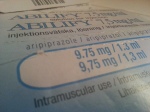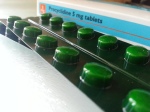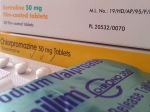Under section 3 of the mental health act, medication is compulsory in hospital. If you refuse to take it, you’re pinned down and injected by force. When I was first admitted to hospital in west London, I was given olanzapine, an antipsychotic but I didn’t like the side effects: confusion, blurred vision, memory loss. It felt like I was trapped in a woolly fog.
Refusenik
 Eventually I refused to take it, and the response was to give me a forced injection of aripiprazole, another antipsychotic (pictured). I found the discarded packaging when I woke up, dazed and disorientated. I don’t remember how long I was knocked out for, and at the time the drug meant nothing to me, and none of the ward staff bothered to explain.
Eventually I refused to take it, and the response was to give me a forced injection of aripiprazole, another antipsychotic (pictured). I found the discarded packaging when I woke up, dazed and disorientated. I don’t remember how long I was knocked out for, and at the time the drug meant nothing to me, and none of the ward staff bothered to explain.
I refused medication twice after that. It was a personal campaign. I kept pushing for talking therapy but that option wasn’t available for reasons that were never made clear to me. Instead, I was taken off the consistently refused olanzapine, and placed on a depot injection, a painful jab I would receive every two weeks. The jab was an antipsychotic, zuclopenthixol decanoate and it left me feeling like a plank of wood floating out into nowhere. I couldn’t smile or express any kind of emotion. Up, down, sorrow, joy. None of it was there. The light was switched off. Everything about the animated me was surpressed, and I couldn’t get to grips with myself. I was locked in a hazy fog and completely disconnected from everything and everyone around me.
Home Treatment Team
I had four depot injections in hospital, and the recommendation was that I remain on those painful jabs for up to a year. No chance. Out of hospital (Oct. 2013), I could refuse medication. Under care of the Home Treatment Team, I had two further jabs at a reduced dose. After that I said no to the depot. Being lost in a chemical haze wasn’t the right treatment for me.
 I described my symptoms to Dr LV, a psychiatrist from the Home Treatment Team. I was a plank of wood and I had other side effects: memory loss, blurred vision, trembling, lack of concentration. I felt dislocated, like I’d lost the vital, creative part of myself. I wanted to come off the depot, and I wanted talking therapy. Dr LV was sympathetic. She said not taking the depot would risk a relapse, but if I really didn’t like the depot there were alternatives. She would look into talking therapy for me, possibly CBT, and she prescribed Procyclidine which she said would ease some of my symptoms. It did, for a week or two. But I didn’t want an escalation in the number of drugs I was taking, so I stopped Procyclidine at same time that I said no to the depot. (Dec. 2013).
I described my symptoms to Dr LV, a psychiatrist from the Home Treatment Team. I was a plank of wood and I had other side effects: memory loss, blurred vision, trembling, lack of concentration. I felt dislocated, like I’d lost the vital, creative part of myself. I wanted to come off the depot, and I wanted talking therapy. Dr LV was sympathetic. She said not taking the depot would risk a relapse, but if I really didn’t like the depot there were alternatives. She would look into talking therapy for me, possibly CBT, and she prescribed Procyclidine which she said would ease some of my symptoms. It did, for a week or two. But I didn’t want an escalation in the number of drugs I was taking, so I stopped Procyclidine at same time that I said no to the depot. (Dec. 2013).
I wanted to start the New Year medication free, but it wasn’t easy. I sunk into a black hole for most of December, and by the end of January I couldn’t sleep, and I was having desperate mood swings and panic attacks. I knew I was in trouble when close friends were buying bags of shopping for me, and when my little brother pretty much ordered me to get help.
Relapse
During the w/c 27 January, I emailed an SOS to my care coordinator. She’s part of the Recovery Team for my local area. I had only met her a couple of times before Christmas, and I wasn’t sure how she would handle my crisis. The last thing I wanted to do was go back to hospital. Thankfully she said hospital was a last resort, and she booked me in to see the team psychiatrist, Dr PH.
 At the meeting with Dr PH I was willing to give medication a try. I was thinking that I might have dumped the depot too quickly or that maybe I was in some form of denial, so I listened to what Dr PH had to say. She knew I was non-compliant with medication and she let me know that talking therapy was being arranged. She explained different types of medication: anitpsychotics, antidepressants, mood stabilisers, sedatives… and she listed the side effects of the drugs she was proposing for me: chlorpromazine (antipsychotic), sertraline (antidepressant), and sodium valproate (mood stabiliser).
At the meeting with Dr PH I was willing to give medication a try. I was thinking that I might have dumped the depot too quickly or that maybe I was in some form of denial, so I listened to what Dr PH had to say. She knew I was non-compliant with medication and she let me know that talking therapy was being arranged. She explained different types of medication: anitpsychotics, antidepressants, mood stabilisers, sedatives… and she listed the side effects of the drugs she was proposing for me: chlorpromazine (antipsychotic), sertraline (antidepressant), and sodium valproate (mood stabiliser).
Only chlorpromazine was new to me. My little brother is on sodium valproate, and a friend of mine was on sertraline for a while and said it had worked for her. I collected the drugs from the hospital pharmacy and tried them straight away. February was a quiet month.
Right to refuse
I dumped sodium valproate because it gave me persistent stomach gripes. Sertraline went the same way, but I stayed on chlorpromazine for a month. It had a calming effect on my panic attacks and mood swings. But I wasn’t keen on the drowsiness and the feeling that I was living in slow motion, so after a while I took fewer tablets, and then I stopped taking them altogether. The crisis was over but the darkness remained.
I’m not stubbornly against medication, it just doesn’t work for me on a daily, ongoing basis. And there’s no way I’m sampling different types until I find “the right one for me”. There is no right one because they all come with side effects. Other treatments work better for me: art therapy, CBT, mindfulness.
Positive psychology has also helped, and so has my new job. I’m a mental health support worker responsible for some very vulnerable clients. I have to oversee their medication and also dispense it which threw up some awkward emotions for me. Thankfully the clients have the right to refuse their medication, and I get to advocate on their behalf, pushing for medication reviews, changes in dosages, and the cessation of drug treatment. It’s very empowering and lights up the dark no end.



Everyone reacts differently to meds and therapy almost always helps. Glad you found what helps you!
Thanks 🙂 after a long struggle I think I’ve got the balance right.